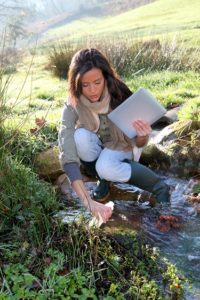
Aquatic Biology is a sub-discipline of biology (the science of living things) concerned with the freshwater ecosystems of our planet. They will study wetlands, rivers, lakes and ponds and river mouths.
What Does An Aquatic Biologist Do?
There is a wealth of jobs out there that a graduate with a degree in this field can do. Many prefer fieldwork, researching and studying the various life forms that populate our water bodies. They can go on to become experts in fish and other animals, plankton and algae, and plants. They may work in the field collecting samples or carrying out monitoring or conservation work, or they can run tests in labs. Their skill set is so diverse that they may work in the public or private sector, or for charitable organizations - typically in conservation work. They may also work with monitoring pollution levels in water, concerning themselves with the effect that such pollutants and nutrient levels may have on the life forms that have made their homes in rivers and lakes. Their role is similar to that of a marine biologist who works with solely ocean life.
Where Does An Aquatic Biologist Work?
The majority of experts in the field of Aquatic Biology work for government bodies, due to the natural of environmental conservation. This means National Parks and EPA for policy-making and government advisory, and teaching / college lecturing. Protecting our bodies of water is as important as protecting the air we breathe and the land-based life. The US is subject to local, national and international laws on environmental regulation, so it's likely that most graduates will be involved in conservation or monitoring.
Another major area where Aquatic Biologists may be employed will include the charitable sector, particularly those that have animal collections. Aquariums and zoos, and even museums, are always a great employment area, even though competition for these types of job are high.
In private business, they may work in biotech developing treatments and vaccines, particularly in areas such as genetics or material development. As the world moves away from fossil fuels, we are looking for more sustainable organic materials from which to manufacture material goods.
In any of these sectors, they may work in an office, outside, in labs, or a combination of all three.
What is the Average Aquatic Biology Salary?
As of May 2020, aquatic biologists, who fall under the broader BLS category of zoologists and wildlife biologists, earned a median salary of $66,350. The top payer in this profession is the federal government, which reported a median salary of $81,530 during this time.*
Aquatic Biologist Jobs & Job Description
Aquatic biologists study organisms in lakes, streams, ponds, oceans and other bodies of water. Biologists specialize in species based on their environment. Because of the number of bodies of water on Earth, as well as the vast diversity of organisms that live underwater, projects and roles do vary. However, most aquatic biologists can expect to encounter the following tasks as part of their job:
- Provide knowledge and feedback on aquatic organism management
- Stay abreast of research and current developments in the field
- Collect field data on organisms in the field and human impact on the aquatic system in question
- Understand and implement sustainable resource management, ecosystem management and landscape planning theories, principles and practices
- Study aquatic and terrestrial ecosystems, fish and wildlife habitat, population assessment and environmental impacts.
- Use biological modelling tools and software, create hypotheses and scenarios to model, and extrapolate results to real world environment
- Design fish and wildlife surveys
- Implement aquatic harvest regulation systems and surveys
- Proficiently use computers, internet, email and software applications including statistical, spatial, population and habitat modelling, databases, and geographic information systems
- Explain technical information in plain language to clients
- Liaise with specialists and external stakeholders
- Compose scientific and technical reports
- Manage projects and delegate organizational skills to design, plan and lead scientific studies/survey projects, including preparing and managing project budgets
- Contribute to environmental assessments, environmental effects monitoring programs, environmental permitting, and research projects
- Provide consultation to regional and national aquatic service area for a variety of clients and stakeholders
- Act as liaison for contractors and clients
- Develop field programs, teams, field work execution and report preparation protocols
- Write proposals and reports for fund raising and information sharing purposes
Senior aquatic biologists are often utilized for their breadth of management and technical experience. In a tier-2 or senior role, aquatic biologists will perform the following duties:
- Advise the planning of resource management and land use planning initiatives
- Support personnel and timelines for project resources and timelines
- Demonstrate negotiation and interpersonal skills
- Develop, lead, manage and support components of projects in the marine environment
- Promote a strong health and safety culture in the lab, office and field
- Manage existing and new projects such as marine surveys, marine components of environmental assessments, marine monitoring programs, data management, statistical analysis and interpretation;
- Coordinate and track assignments, scopes, schedules, benchmarks, budgets and deliverables
- Demonstrate leadership; coordinate staff across operating unit
- Prepare regulatory applications and approvals
- Manage and communicate with clients, develop new projects and business leads
- Be ready to reconcile differing interpersonal and scientific points of view
- Garner support from various stakeholders through open forums and presentations
- Provide expertise and advice on ecological impacts of activities and management of resource issues
- Interpret and apply relevant legislation, regulations, policies, procedures and guidelines.
- Provide technical direction to staff
- Mentor staff
- Support field work and workgroups
What is the Job Demand for Aquatic Biology?
The job demand for aquatic biologists between 2020 and 2030 is projected to increase by 5 percent. Job growth in this field is dependent on commitments to environmental issues and new standards on pollution and climate mitigation.*
What are the Education Requirements to Become An Aquatic Biologist?
Unlike Marine Biology which is a large sub-discipline considered broad enough to require its own field of study, presently there are no degrees specifically for Aquatic Biology in the US. Students may take a BS or BA in Marine Biology or standard Biology and use post-graduate study, where available, to further develop their niche into Aquatic Biology. Other options include zoology, environmental biology or other biological sciences including ecology, fisheries and conservation. Develop your focus on aquatic life as you progress.
You may study a BA or BS for many of these courses. Which you choose depends on your career path. BAs are degrees for the subject in practice; BS degrees are suitable for research based roles such as lab work or teaching. A Bachelor's will be suitable for most jobs but the higher up you intend to go, the more qualifications you will need. To teach and research at a college you will certainly need a doctorate.
Aquatic Biology - Related Degrees
What Kind of Societies and Professional Organizations Do Aquatic Biologists Have?
Aquatic Biology is a recognised major discipline separate from Marine Biology to which it is closely related. There are few dedicated to fresh water conservation and biology issues, and here are the most prominent.
- Fresh Water Society: They began in 1965 and created as a result of increased awareness of damage to fresh water following a succession of five freak hurricanes. The contamination of debris was one of the US' biggest freshwater environmental hazards. Since then, the FWS has worked hard to promote the importance of conserving and protecting freshwater bodies in the US.
- FBA (UK based): The Freshwater Biological Association was founded in 1929 as a major body devoted to research and promotion of issues pertaining to fresh water ecologies. They hold regular meetings, organize conferences and considered one of the foremost freshwater research, education and protection organizations in the world.
- Society for Conservation Biology: Although their main remit is conservation of biological life whatever its habitat, the SCB presently has a Freshwater Working Group (FWWG) that was founded in 2003 to specifically deal with issues concerning life in this type of water body.
*2020 US Bureau of Labor Statistics salary figures and job growth projections for zoologists and wildlife biologists reflect national data not school-specific information. Conditions in your area may vary. Data accessed September 2021.





